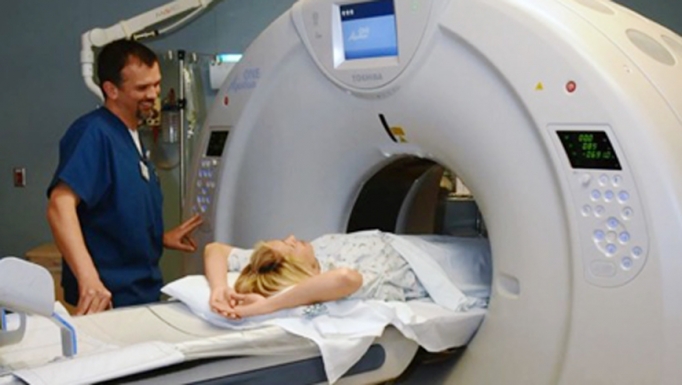Lung Cancer Screenings Save Lives

Amy Perugini, RN
McLeod Lung Cancer Screening Nurse Navigator
Lung cancer is the leading cause of cancer-related deaths in both men and women in the United States, more than breast, prostate and colorectal cancers combined. In addition, 90 percent or more of all lung cancers are caused by cigarette smoking, according to the Centers for Disease Control and Prevention (CDC).
The risk of developing lung cancer for a current smoker with a history of smoking a pack a day for 40 years is about 20 times higher than that of the non-smoker. The best way to minimize the risk of developing lung cancer is to never start smoking.
Our mission at McLeod through the Healthy Lung Initiative Program is to save lives in our community through early detection and enhanced access to care. This allows us to see an increase detection in early lung cancer diagnoses with curative options while decreasing later stages of lung cancer. We want to provide not only access to screening, but for patients to also have easy access to our experts in pulmonology, cardiothoracic surgery, radiation oncology, and medical oncology.
As with most cancers, early detection remains the key to survival. Until recently, there were not reasonable tests for early detection because the tumors are not always visible on a chest X-ray. Historically, a patient would be diagnosed with lung cancer once they developed symptoms such as coughing up blood, unintentional weight loss, or shortness of breath.
Additionally, early-stage lung cancer patients often do not have symptoms and can go for months and potentially years without detection. These are the reasons that screening for those at high risk for lung cancer has been recognized as an important method in saving lives.
Fortunately, for those who have been smoking for years and are considered high risk, there is now a screening tool to detect lung cancer with scientific data showing the benefits. Screening means testing an individual before they have symptoms of disease. A landmark study, called the National Lung Cancer Screening Trial (NLCST), published in 2011 indicated that low-dose computed tomography (CT) scans of the lungs of a patient with a significant smoking history led to earlier diagnosis, treatment, and a reduced chance of death. A lung CT scan can detect small nodules on the lungs years before they can be seen on a regular chest X-ray.
The NLCST involved more than 53,000 patients who were former or active smokers. Results showed a low-dose CT scan of the chest was better than a chest X-ray for detecting lung cancers. The study went on to reveal that for every 320 high-risk patients screened, one life was saved. Additionally, the study of patients ages 55 to 74 years with a 30 pack-year history of smoking or former smokers, who met the requirements such as being without signs, symptoms or history of lung cancer, found that there was a 20 percent risk reduction in mortality using low dose CT scans versus chest X-ray.
In 2014, the McLeod Lung Cancer Screening Program was established based on the results of this trial. This is the biggest advancement in lung cancer detection for more than 25 years. Physicians can now detect small, early-stage, potentially curable lung tumors. In fact, when lung cancer is detected at an early stage, patients have a five-year survival rate of 56 percent after treatment. If the cancer has spread to nearby organs, the five-year survival rate declines greatly to five percent.
The screening guidelines followed by McLeod Health include:
- 50 to 80 years of age who have had a 20 or more pack-year history of cigarette smoking (20 pack-year is equivalent to one pack per day for 20 years or two packs per day for 10 years)
- currently exhibiting no symptoms of lung cancer
- currently smoking or have quit smoking within the last 15 years
Similar to cancers of the breast, colon, and prostate, it is obvious that the early detection of lung cancer with a screening CT scan provides for a greater chance to be cured with surgery including the possibility of minimally invasive surgery or radiation treatment such as stereotactic body radiation therapy.
Additionally, five McLeod Health hospitals have been designated as Lung Cancer Screening Centers by the American College of Radiology (ACR) — McLeod Regional Medical Center, McLeod Health Dillon, McLeod Health Cheraw, McLeod Health Seacoast and McLeod Health Clarendon.
The ACR Lung Cancer Screening Center designation is a voluntary program that recognizes facilities that have committed to practice safe, effective diagnostic care for individuals at the highest risk for lung cancer.
For more information on Lung Cancer Screenings, please call the McLeod Healthy Lung Initiative at (843) 777-5953.
Amy Perugini, RN, serves as the Lung Cancer Screening Nurse Navigator for McLeod. She has been with McLeod Health for 14 years – seven of those caring for oncology patients. Prior to her current role, Perugini worked as an oncology infusion nurse in the McLeod Center for Cancer Treatment and Research. She obtained her Associate Degree in Nursing from Florence-Darlington Technical College and completed her Bachelor of Science in Nursing at Francis Marion University.
-
McLEOD REGIONAL MEDICAL CENTER FLORENCE
843-777-2000 -
McLEOD DARLINGTON
843-777-1100 -
McLEOD DILLON
843-774-4111 -
McLEOD LORIS
843-716-7000 -
McLEOD SEACOAST
843-390-8100 -
McLEOD CHERAW
843-537-7881 -
McLEOD CLARENDON
803-433-3000



-
McLEOD REGIONAL MEDICAL CENTER FLORENCE
843-777-2000 -
McLEOD DARLINGTON
843-777-1100 -
McLEOD DILLON
843-774-4111 -
McLEOD LORIS
843-716-7000 -
McLEOD SEACOAST
843-390-8100 -
McLEOD CHERAW
843-537-7881 -
McLEOD CLARENDON
803-433-3000
 Find a Doctor
Find a Doctor  Locations
Locations  Services
Services